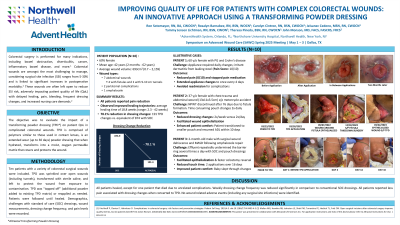Practice Innovations
(PI-040 (RPT-007)) Improving Quality of Life for Patients with Complex Colorectal Wounds: Innovative Approach Using Transforming Powder Dressing

Colorectal surgery is performed for many conditions, including bowel obstruction, diverticulitis, cancer, inflammatory bowel disease, and more.1 Colorectal wounds are some of the most challenging wounds to manage, considering surgical site infection (SSI) ranges from 5-30% and is linked to significant increases in postoperative morbidity.2 These wounds are often left open to reduce SSI risk, adversely impacting patient quality of life (QoL) with delayed healing, pain, bleeding, frequent dressing changes, and increased nursing care demands.2
Methods:
The objective was to evaluate the impact of a transforming powder dressing (TPD) in simplifying care of complicated colorectal wounds and improving patient QoL. TPD, comprised of polymers similar to those used in contact lenses, is an extended wear (up to 30 days) powder dressing that when hydrated, transforms into a moist, oxygen permeable matrix that protects the wound. TPD was sprinkled over open wounds (including tunnels), transformed with sterile saline, and left to protect the wound from exposure to contamination. Patients were followed until healed and TPD was topped off or reapplied as needed. Demographics, challenges with SOC dressings, wound measurements, dressing change frequency, pain and satisfaction were recorded.
Results:
Ten patients with a variety of complicated, surgical colorectal wounds were included. Of the 10 patients, 60% were female with an average age of 42.2 years (range: two months to 62 years). Seven had abdominal wounds (four with fistulas, and two with 9-10 cm tunnels), two had peristomal complications, and one had omphalocele. Wound volume averaged 693.3 cm3 (range 0.7 cm to 2159.4 cm3). All patients healed (average 18.8 weeks; range 2.3-42 weeks) with no SSIs. Weekly dressing change frequency was reduced by 78.1% (total of 191.4 TPD changes over the TPD treatment period compared to equivalent of 873.9 with SOC). All adult patients reported reduced pain, and increased satisfaction with TPD compared to SOC.
Discussion:
TPD was utilized in complicated colorectal wounds resulting in reduced pain, increased patient satisfaction, and significantly less dressing changes when compared to SOC. No SSIs or other complications were identified. TPD should be considered for treating complex colorectal wounds.

.jpg)
